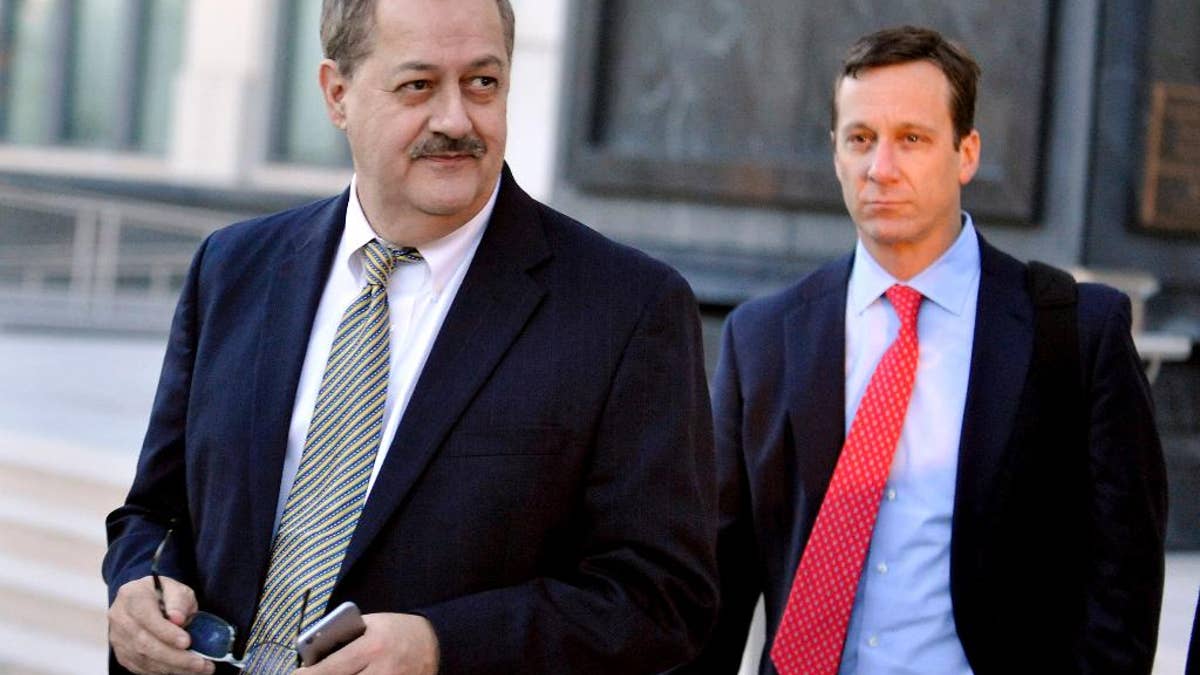
FILE - In a Tuesday, Nov. 24, 2015 file photo, former Massey Energy CEO Don Blankenship, left, walks out of the Robert C. Byrd U.S. Courthouse after the jury deliberated for a fifth full day in his trial, in Charleston, W.Va. A federal appeals court has affirmed the conviction of former Massey Energy CEO Don Blankenship in connection with the deadliest U.S. mine disaster in four decades. The 4th U.S. Circuit Court of Appeals handed down the opinion Thursday, Jan. 19, 2017, saying it found no reversible errors in trial rulings. (AP Photo/Chris Tilley, File) (The Associated Press)
CHARLESTON, W.Va. – A federal appeals court affirmed the criminal conviction of former Massey Energy CEO Don Blankenship on Thursday in connection with the deadliest U.S. mine disaster in four decades.
The 4th U.S. Circuit Court of Appeals said the evidence shows Massey was repeatedly cited for safety violations at West Virginia's Upper Big Branch coal mine before the 2010 explosion that killed 29 men. In 2009 alone, the U.S. Mine Safety & Health Administration identified 549 violations there, the court noted.
Blankenship was aware of violations, receiving daily reports, Judge James Wynn wrote. Many concerned improper ventilation and accumulation of combustible materials.
"Notwithstanding the numerous citations and warnings, defendant has a 'policy to invariably press for more production even at mines that he knew were struggling to keep up with the safety laws,'" Wynn wrote. Chief Judge Roger Gregory and Senior Judge Andre Davis agreed.
Blankenship was convicted in 2015 of a misdemeanor, conspiring to violate the federal mining safety law, and sentenced to a maximum year in prison. The 66-year-old is scheduled for release May 10.
Blogging from a federal prison in California, he has called himself an "American political prisoner."
A call to his attorney William Taylor was not immediately returned Thursday.
The three-judge panel rejected the argument by Blankenship's attorneys that jury instructions about "reckless disregard" for the consequences of his decisions made it too easy to conclude that he willfully violated safety rules.
The court also rejected arguments by the Ohio, Illinois and Virginia coal associations that this willfulness standard represents "an expansion of criminal law to the point that mere involvement of company management in certain affairs can serve as a basis, in whole or in part, for criminal prosecution."
Wynn wrote that "Congress intended to bring conduct evidencing reckless disregard within the meaning of 'willfully.'"
"In particular, Congress imposed enhanced penalties in the Mine Safety Act because it found 'mine operators still find it cheaper to pay minimal civil penalties than to make the capital investments necessary to adequately abate unsafe or unhealthy conditions,'" he wrote.
Holding mine operators personally criminally liable is meant to deter large corporations from choosing production over safety compliance because financial penalties won't do it, Wynn wrote.
Blankenship was also fined the $250,000 maximum permitted by law. He was acquitted of securities fraud at the six-week trial.
___
Information from: The Charleston Gazette-Mail, http://wvgazettemail.com.

